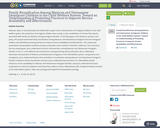
National, state, or local-level data are limited with respect to the characteristics of immigrant children in the child welfare system, the proportion of immigrant children who reunify, or the constellation of services that may be associated with family reunification among immigrant families. To fill these gaps in the literature, practice, and policy, this project examined family reunification among Mexican and Vietnamese immigrant and non-immigrant children and identified promising practices to improve service availability and effectiveness. This study used quantitative and qualitative methods and was conducted in two counties in Northern California. This curriculum has five overall goals: (a) to understand common characteristics among Mexican and Vietnamese immigrant families in the U.S. and California and connections among parenting and acculturation; (b) to understand distinctive characteristics of Mexican and Vietnamese immigrants in the child welfare system, compared to non-immigrants; (c) to understand factors that contribute to reunification among Mexican and Vietnamese immigrant families involved in family reunification services; (d) to understand how the work of a child welfare worker influences service availability for Mexican and Vietnamese immigrant families; and (e) to understand the basic components of cultural competence and how these relate to service effectiveness with immigrant families involved in the child welfare system. Video clip (coming) and PowerPoint Presentation (coming).Osterling, K. L., & Han, M. (2013).
- Subject:
- Social Work
- Material Type:
- Module
- Author:
- CalSWEC
- Date Added:
- 02/26/2018
